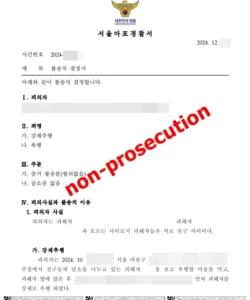Table of Contents
Foreigners can divorce in Korea
Foreigners in Korea can also get divorced under the Korean Family Law, regardless of their nationality. However, there may be some additional steps or requirements that must be met, such as the translation of certain documents into Korean and proof of residency, entry & exit records, etc in Korea depending on the case. Also, the divorce proceedings and requirements may vary depending on the laws of the country where the foreign spouse is a citizen, or where your marriage life is mostly spent.
Consulting with a family law attorney
It is recommended that a foreigner seeking a divorce in Korea consult with a local attorney who has experience with foreign ex-pats and is well-specialized in the laws and procedures and the unique challenges that can arise in international divorce cases. A good family attorney can help ensure the divorce is handled correctly and your rights and interests are protected throughout the process.
Issues of divorce in Korea for foreigners
If a foreigner wants to get a divorce in Korea, would be subject to the same divorce laws and procedures as Korean citizens, if it meets the requirements of international divorce in Korea.
Hiring a family law expert attorney who speaks fluent both English and Korean will be very helpful. Because the process of divorce for a foreigner may include some additional steps and complication issues, such as jurisdiction, investigating the property for division, child custody, and support, visitation right and arrangements, potential risk of international child abduction or wrongful retention, etc.
A well-experienced family attorney in international divorce will set out the best strategy, with an understanding of those potential legal issues, and navigate the differences between the divorce laws of your home country and Korea, including divorce proceedings in Korea before you launch any legal action.
Things foreigners should know about divorce in Korea
We’d like to provide you with the following information about divorce in Korea for foreigners if you wish to obtain a divorce in Korea.
Types of divorce in Korea
There are 3 types of divorce in Korea by law.
- by Agreement(uncontested divorce)
- Divorce by Mediation
- by Trial(contested divorce)
A divorce by trial as we all are very aware, it’s a lawsuit. If you’re familiar with the notion of “Uncontested divorce”,
if you agree with every term with your spouse, it can be a divorce by agreement, or divorce by mediation. But the major difference between each procedure is that the Korean family court will require both parties’ physical attendance and reattendance, plus there will be a wait of at least 1 month to 3 months when you’re in the process of divorce by agreement, but in mediation divorce, your appearance is not required when you have a lawyer to represent you, and it’ll be done in 1 to 1.5month.
If it’s expected that you don’t reach an agreement with your spouse, or if you want your spouse to be recorded as the faulty party of the marriage breakdown, it’s a “Contested divorce”, and the proper process will be divorce by trial.
About these 3types of divorce proceedings, we’ll address them in detail later.
Legal grounds for divorce
When a divorce of a foreigner is governed by Korean law, Article 840 in the Civil Acts of Korea, states 6 legal grounds for divorce in Korea since Korea has fault-based divorce.
- Adultery, or an act of unchastity
- Malicious Desertion, Abandonment.
- Extreme Maltreatment of one spouse by the other spouse or parents-in-law.
- Extreme Maltreatment of one spouse’s parents by the other spouse or parents-in-law.
- More than 3 years of Unknown Death of Life of spouse
- Any other serious reason irreconcilable to continue to be in marriage
It’s important to collect the evidence to present if you want to have a contested divorce based on these grounds because it’s also related to the emotional damage compensation you will get.
Attendance in divorce court
When you choose to divorce by Agreement, your and your spouse’s attendance is essential. If one party fails to appear to the court, it may be back to square one. But when you have a divorce lawyer who represents you, your attendance is not required by Korean law.
Family court investigations
If you’re going to divorce by trial, there will likely be a family investigation by court order to figure out
- The causes of marriage breakdown; if the marriage breakdown is irreconcilable
- If there’s a need for family expert counselor intervention is needed
- Child upbringing environment
- Relationship with the child/ren of each spouse
- Family support, the financial contribution of spouses, etc
This process takes 2 months to 6 months.
Issues of divorce in Korea
Every marriage in the world probably has the same or similar matrimonial issues, but if in divorce lawsuit in Korea, the issues will be addressed as follows ;
- Grounds of divorce: Agreement, or Fault-based.
- Child custody and Parental rights
- Child support
- Visitation right
- Property division
- Emotional distress compensation: If it’s fault-based.
- F6 visa after divorce: If you are married to a Korean and holding F6 visa, there are several ways you can keep your immigration status.
Lee & Lee law office’s english speaking lawyers provide clients with the highest quality representation
SEOUL, Gangnam Office (Korea) | Kristen Y. LEE
2F, 27-6, 162 Gangnam-daero, Gangnam-gu, Seoul, Republic of Korea
FAQ
Can a foreigners get divorced in korea?
– Yes, foreigners can get divorced in Korea under the same laws and procedures as Korean citizens, if your spouse is in Korea, or your common habitual residence is or was in Korea, or your marriage mostly takes place in Korea, or if parties agree to get a divorce in Korea. Even if you’re not in Korea, when you hire a divorce attorney, you can proceed and get a divorce in Korea by Korean law.
What should a foreigner do if they want to get divorced in korea?
If a foreigner wants to get divorced in Korea, it is highly recommended to consult with a family law specialist attorney who has experience with international divorce cases and speaks Korean and your language, such as English. A good attorney will assist you to navigate the Korean legal system in divorce matters, listen to your concerns, and set out a legal strategy to minimize the risk and benefits you.
What is the divorce process in Korea?
To file for divorce in Korea, except for the Complaint copy (in case of a Divorce by Trial), a Petition copy(in case of a Divorce by Mediation), or Agreement paper(in case of a Divorce by Agreement), the document of marriage certificate/marriage license in Korea, or your home country, family relation certificate, or child’s birth certificate, proof of residency, etc are required.
How long does it take to get divorced?
It depends on the types of divorce proceedings you choose. First, if it’s an “Uncontested Divorce”, and you choose a “Divorce by Agreement”, it will be 2 months to 5 months due to the mandatory waiting period (it’s called “consideration period”) by Korean law especially when you have a child(children), if you choose “Divorce by Mediation” based on the divorce settlement agreement, it will be finalized within a month or two. But in the case of “Contested Divorce” by Trial or by Mediation, it would be prolonging procedures that consume at least 6 months to years.
How can I get a divorce in Korea?
If you have an agreement on divorce with your spouse, you can choose the proceeding between “Divorce by Agreement” and “Mediation Divorce”. The difference is 1) the requirement of your attendance to the court date, and 2) the Time period upward to the divorce decree. If you file for a divorce lawsuit in Korea as a foreigner, the court will require you to submit the grounds for divorce such as irreconcilable differences, infidelity, abuse, and other factors that make it difficult for the spouses to continue living together.
Can I stay in Korea after the divorce?
You can keep an F6 visa(spouse visa, marriage visa) after the divorce, 1) if your Korean spouse is a faulty party of your divorce, or 2) if you have a child(children), and you get custodial or visitation rights, you can keep F6(more precisely F-6-2 visa) until your child ages majority.




